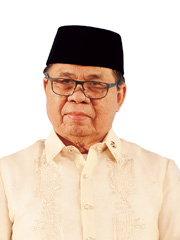
Bangsamoro: Making Peace and Human Security Work
- Ahod Al HAJ Murad Ebrahim
Profile:
Born in 1949, he is a key figure in the creation of the Bangsamoro Autonomous Region in Muslim Mindanao (BARMM), where he currently serves as Interim Chief Minister. He has been involved in armed struggle since 1968, and has held prominent roles in diplomatic negotiations with the Government of the Philippines and the global Islamic organizations.
The ratification of the Republic Act 11054 or the Bangsamoro Organic Law (BOL) last January 25, 2019 marked an unprecedented milestone for the Government of the Philippines and the Moro Islamic Liberation Front (GPH-MILF) Peace Process.
The law establishing the Bangsamoro Autonomous Region in Muslim Mindanao aims to put an end to the decades-long conflict in Mindanao by providing a significant political settlement and adopting policies centered on human security.
The new political entity is currently under the administration of the Bangsamoro Transition Authority which holds both executive and legislative powers. I was appointed by President Rodrigo Roa Duterte to oversee the transition period, which will end in the middle of 2022.
I have emphasized the need to strengthen policies and programs that prioritize human security above anything else especially during a time when the world is grappling with the challenges brought upon it by the COVID-19 pandemic.
The main goal of this transition period is to establish a bureaucracy that is responsive to the decades-long needs of our people, to create sustainable programs that highlight our experience, our people, and our desire for human security.
Beyond the transition period
The Bangsamoro Government has installed various programs and policies through its various ministries to address the immediate needs of its constituency. However, the main thrust of the transition period is to put up priority codes that would enable the regular government to function in the new bureaucracy.
I believe that establishing a government that acknowledges the importance of laws would be a step further towards realizing the importance of human security by implementing a key component of such, rule of law.
Freedom from Fear, Freedom from Want
The present administration acknowledges that the creation of the new bureaucracy requires collective support from the ground. As of March 2020, right before the pandemic, around 12,000 MILF fighters were decommissioned and are now engaging in programs to become productive members of the society. I believe that this is the first step towards healing.
We hope that not only can we transition the regional government towards a more responsive system, but also help in trasitioning the communities which suffered decades-long of armed conflict, into self-reliant and resilient communities in the Bangsamoro.
JICA has been one of our most trusted partners in our journey to peace starting from the peace talks up to this transition period. In order to realize self-reliant and resilient communities, we are especially keen on expanding JICA's Upland Rice-Based Farming Technology Program for the Bangsamoro (URTPB). We have received reports from the ground that URTPB has not only improved the farming skills of our farmer-combatants but has also greatly improved their income.
Long journey ahead
While the three years of transition period may not be enough, what matters right now is the ability to see a brighter hope which the Bangsamoro holds on to - matched with policies that truly reflect their collective desire towards self-determination.




scroll